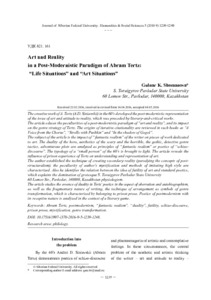Art and Reality in a Post-Modernistic Paradigm of Abram Tertz: “Life Situations” and “Art Situations”
Скачать файл:
URI (для ссылок/цитирований):
https://elib.sfu-kras.ru/handle/2311/20273Автор:
Shomanova, Gulnar K.
Шоманова, Г.К.
Дата:
2016-05Аннотация:
The creative work of A. Tertz (A.D. Siniavskii) in the 60’s developed the post-modernistic representation
of the issue of art and attitude to reality, which was preceded by literary-and-critical works.
The article educes the peculiarities of a post-modernistic paradigm of “art and reality”, and its impact
on the genre strategy of Tertz. The origins of iterative citationality are reviewed in such books as “A
Voice from the Chorus”, “Strolls with Pushkin” and “In the shadow of Gogol”.
The subject of the article is the impact of “ fantastic realism” of the writer on pieces of work dedicated
to art. The duality of the hero, aesthetics of the scary and the horrible, the gothic, detective genre
tactics, adventurous plots are analyzed as principles of “ fantastic realism” or poetics of “schizodiscourse”.
The typology of a “small person” of the 60’s is brought to light. The article reveals the
influence of prison experience of Tertz on understanding and representation of art.
The author established the technique of creating secondary reality (parodying the concepts of poststructuralism);
the peculiarity of author’s mystification and methods of imitating high style are
characterized. Also he identifies the relation between the idea of futility of art and standard poetics,
which explains the domination of grotesque S. Toraigyrov Pavlodar State University
60 Lomov Str., Pavlodar, 140000, Kazakhstan physiologism.
The article studies the essence of duality in Tertz’ poetics in the aspect of aberration and autobiographism,
as well as the fragmentary nature of writing, the technique of arrangement as symbols of genre
transformation, which is characterized by belonging to prison prose. Poetics of postmodernism with
its receptive nature is analyzed in the context of a literary game В творчестве А. Терца (А.Д. Синявского) 60-х годов развивалась постмодернистское
представление вопроса искусства и отношения к действительности, которому
предшествовали литературно-критические работы.
В статье выявляются особенности постмодернистской парадигмы «искусство и
реальность», а также ее влияние на жанровую стратегию Терца. Рассматриваются
истоки сквозной цитатности как в книге «Голос из хора», так и в поэтике книг «Прогулки с
Пушкиным» и «В тени Гоголя».
Предметом статьи является влияние «фантастического реализма» писателя на
произведения, посвященные искусству. Анализируется двойственность героя, эстетика
страшного и ужасного, готического, жанровая тактика, авантюрные сюжеты как
основные принципы «фантастического реализма» или поэтика «шизодискурса». Освещается
типология «маленького человека» 60-х годов. Демонстрируется влияние тюремного опыта
Терца на понимание и представление искусства.
Автор установил методику создания вторичной реальности (пародируя концепции
постструктурализма). В статье характеризуется особенность мистификации автора
и методы имитационного высокого стиля. Выявляется соотношение между идеей
бесплодности художественной и нормативной поэтики, что объясняет доминирование
гротескной физиологии.
Суть двойственности в поэтике Терца рассматривается в аспекте аберрации и
автобиографизма. Как символы жанровой трансформации, фрагментарный характер
письма, методика систематизации характеризуются принадлежностью к тюремной
прозе. Поэтика постмодернизма с ее рецептивным характером анализируется в контексте
литературной игры

